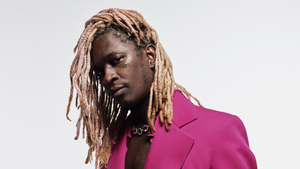Young Thug has been released from jail after he pleaded guilty to gang, drug and gun charges, and was handed a sentence of time served with fifteen years probation. It was a sudden and dramatic ending to a chaotic and long-running trial that centred on allegations that the rapper’s label YSL was, in fact, a criminal gang responsible for murder, armed robbery and carjackings.
The news was welcomed by Kevin Liles, who said that there would be time to “discuss the criminalisation of hip-hop lyrics” in the future, but - for now - “everyone should feel nothing but joy that this amazing artist and even better man can hug his children, parents, siblings and other loved ones tonight”.
Liles was, until recently, the boss of Young Thug’s distribution partner, Warner Music’s 300 Entertainment, and he has been outspoken about the criminal case against the rapper and especially the use of his lyrics as evidence. “Words can’t express the incredible happiness and relief I feel”, he added about hearing that the rapper had been freed from jail.
The sudden and abrupt end to the trial followed days of plea deal negotiations between lawyers representing the rapper, real name Jeffery Williams, and state prosecutors. Although the basis of a deal had been agreed, prosecutors were pushing for a significant jail term as part of that arrangement, with 25 years in custody and another 20 on probation.
After talks regarding a deal on sentencing stalled, Williams entered a non-negotiated guilty plea in court, which basically lets the judge decide on what the sentence should be. The rapper pleaded guilty to one gang charge, three drug charges and two gun charges, and pleaded no contest to charges relating to leading a gang and violating Georgia’s Racketeer Influenced & Corrupt Organisations - or RICO - Act.
Although the sentence is significantly less than what prosecutors were pushing for, there are wide ranging restrictions on what Williams can and can’t do, as well as severe penalties if he breaches the terms of his probation.
The restrictions imposed mean that Williams is banned from contacting gang members and most of his former co-defendants, as well as being prohibited from remaining in the metropolitan Atlanta area for the first ten years of his probation period, except in special circumstances. The rapper will also have to serve 100 hours of community service and, if he breaches the terms of his probation, he faces another 20 years in jail.
According to the BBC, Williams said in court, “I take full responsibility for my crimes, for my charges - to really everybody that has got something to do with this situation, I want to say sorry”. Judge Paige Whitaker told the rapper, “I want you to try to be more of the solution and less of the problem”.
Williams was first charged in May 2022 and has been in jail ever since. A total of 28 people were charged in relation to the gang allegations, including another YSL rapper, Gunna. Many of those charged, including Gunna, took plea deals much sooner, with the case against Williams and five others finally getting properly to trial in November last year after ten months of jury selection.
Once the trial was underway there were plenty of dramas, with the original judge overseeing the case recusing himself over allegations he inappropriately held a closed-door meeting with prosecutors and a key witness.
Defence lawyer Brian Steel was also found in contempt of court for refusing to share how he found out about that meeting, though his contempt conviction was then thrown out by the Georgia Supreme Court last month.
Beyond the courtroom dramas, the other big controversy in the case related to the prosecution using Williams’ creative output as evidence against him.
The use of lyrics and music videos as evidence in criminal cases has been widely criticised within the music industry on free speech grounds. It’s also argued that this practice unfairly prejudices against rappers, because juries are prone to believe, often incorrectly, that rap lyrics are more rooted in reality.
Three other defendants involved in the case recently reached plea deals with prosecutors, meaning just two defendants are still fighting the charges against them.

